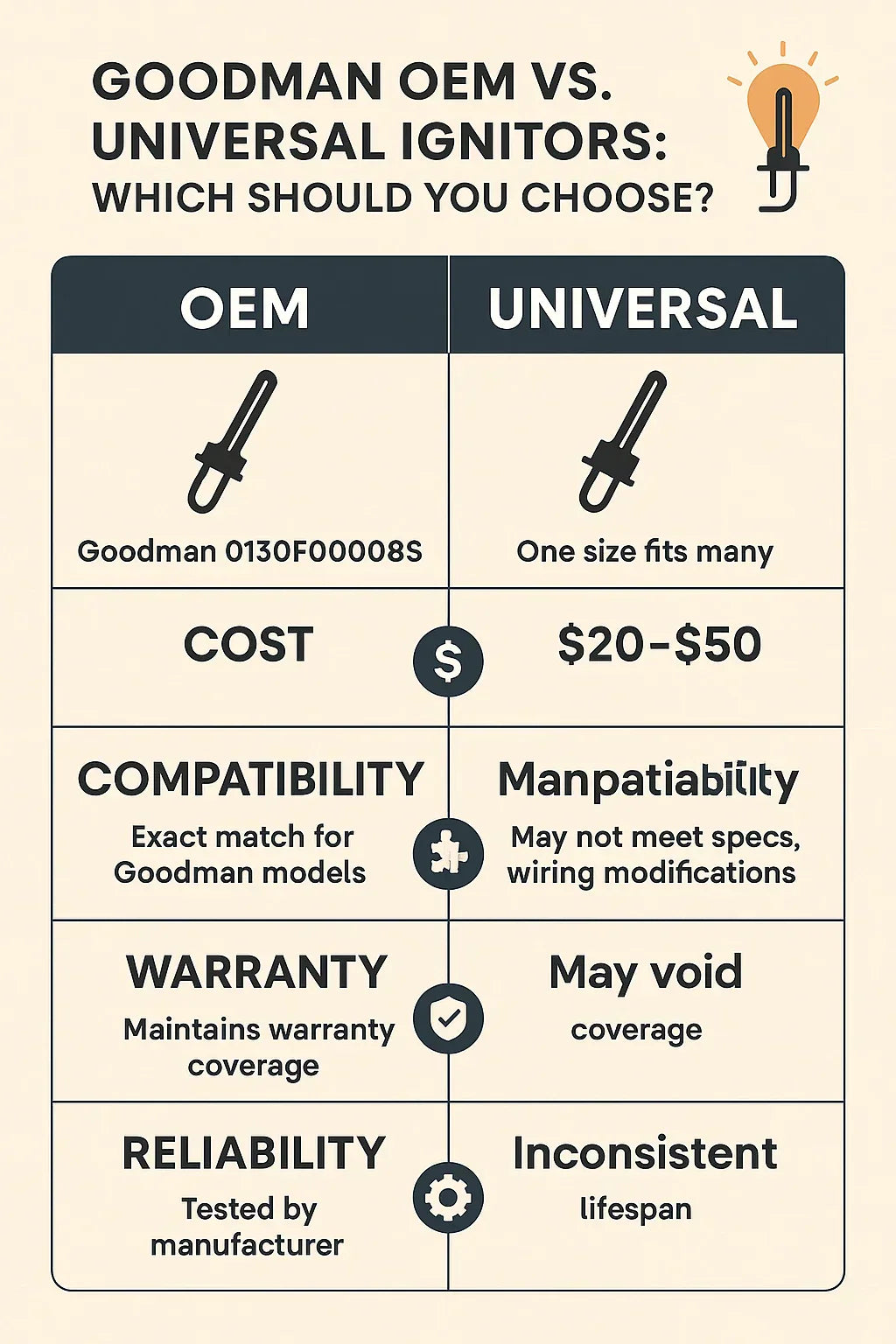When your furnace won’t start, the hot surface ignitor (HSI) is one of the first components to check. For Goodman furnaces, the OEM replacement part is the 0130F00008S hot surface ignitor — a silicon nitride design built specifically for Goodman, Amana, and Daikin units.
But at your local supply store or online, you may also find universal ignitors marketed as “one size fits many.” They’re often cheaper, but are they worth it?
In this guide, we’ll compare Goodman OEM ignitors vs. universal ignitors, covering cost, performance, reliability, warranty, and when each option makes sense for Savvy homeowners.
🏷️ What Is an OEM Ignitor?
OEM (Original Equipment Manufacturer) ignitors are parts designed and tested by the same company that made your furnace. For Goodman, that means the 0130F00008S, which is also used in many Amana and Daikin systems.
Advantages of OEM Ignitors:
-
✅ Exact fit and voltage/resistance rating
-
✅ Tested for compatibility with Goodman control boards
-
✅ Backed by manufacturer warranty
-
✅ Longer expected lifespan (5–10 years for silicon nitride)
🔩 What Is a Universal Ignitor?
Universal ignitors are third-party replacements marketed to fit multiple brands. They may include wiring kits or mounting adapters to accommodate different furnaces.
Advantages of Universal Ignitors:
-
✅ Often cheaper ($20–$50 vs. $30–$80 for OEM)
-
✅ Easier to find in emergencies
-
✅ Can work as a temporary fix
Disadvantages:
-
❌ May require splicing wires or modifying mounting brackets
-
❌ Not always a perfect fit → inconsistent performance
-
❌ Different resistance values → risk of control board damage
-
❌ Typically not covered under OEM warranty
For background, see HVAC School – Hot Surface Ignitors.
⚖️ Performance Differences: OEM vs. Universal
While both types of ignitors perform the same function — heating up to ignite gas burners — there are differences in consistency and safety.
OEM Ignitors
-
Designed for specific voltage and current draw
-
Provide consistent glow temperature for reliable ignition
-
Tested with Goodman control boards and gas valves
Universal Ignitors
-
Advertised as “one size fits many” but may not match your furnace’s specs
-
Higher risk of premature burnout due to mismatched electrical resistance
-
May require wiring modifications → higher chance of installation error
👉 Using the wrong ignitor can lead to no ignition, repeated cycling, or even control board damage (a $400–$800 repair).
For troubleshooting insight, see ACHR News – Furnace Ignition Systems.
💰 Cost Comparison in 2025
Here’s how OEM and universal ignitors stack up in terms of cost:
| Type | Price Range | Lifespan | Risk Factor | Notes |
|---|---|---|---|---|
| OEM Goodman (0130F00008S) | $30–$80 | 5–10 years | Very Low | Guaranteed fit + warranty safe |
| Universal Ignitor | $20–$50 | 2–5 years | Moderate | May require wiring modifications |
Professional Replacement Costs (Same for Both)
-
Service call: $75–$125
-
Labor: $75–$150
-
Total installed cost: $150–$300
👉 While universal ignitors save $10–$30 upfront, OEM ignitors can last twice as long and protect your furnace warranty.
For repair cost data, see Furnace Repair Costs.
🛡️ Warranty & Safety Considerations
Warranty protection is one of the strongest arguments for OEM ignitors.
-
Goodman OEM Ignitors – Maintain manufacturer’s warranty coverage, since they’re certified parts.
-
Universal Ignitors – May void warranty if they cause control board or gas valve damage.
Safety Concerns with Universals:
-
Incorrect resistance → ignitor overheats or underperforms
-
Risk of damaging furnace electronics
-
Potential gas buildup if ignition is unreliable
👉 Savvy takeaway: if your furnace is still under warranty, always use OEM.
For official maintenance advice, see Energy Star – HVAC Care Tips.
🛠️ When a Universal Ignitor Might Make Sense
While OEM ignitors are the safest long-term choice, there are a few scenarios where a universal ignitor may be practical:
-
Emergency replacement when OEM isn’t immediately available
-
Temporary fix while waiting for correct part delivery
-
Older furnaces nearing replacement (low risk of warranty issues)
👉 If using a universal, confirm compatibility with your furnace model and be prepared to replace it sooner.
🏠 When to Stick with OEM
For most situations, OEM is the better choice:
-
High-efficiency Goodman/Amana/Daikin furnaces (precise voltage required)
-
Systems under warranty
-
Homeowners prioritizing long-term reliability
-
Avoiding expensive control board damage
OEM Strategy: Keep a spare Goodman 0130F00008S in your home. They’re affordable, easy to store, and give peace of mind during heating season.
🔎 Savvy Homeowner Takeaway
Choosing between Goodman OEM and universal ignitors comes down to balancing short-term savings with long-term reliability.
-
🔹 OEM Ignitors (like the 0130F00008S): $30–$80, longer lifespan, warranty safe, reliable performance.
-
🔹 Universal Ignitors: $20–$50, cheaper upfront, but shorter life and higher risk of issues.
-
🔹 Best Choice for Savvy Homeowners: OEM for reliability, universal only as a backup.
👉 For peace of mind, order and store a Goodman 0130F00008S now — so you’re never left in the cold when your furnace ignitor fails.
In the next topic we will know more about: How Long Should a Hot Surface Ignitor Last? Lifespan & Warranty Insights







